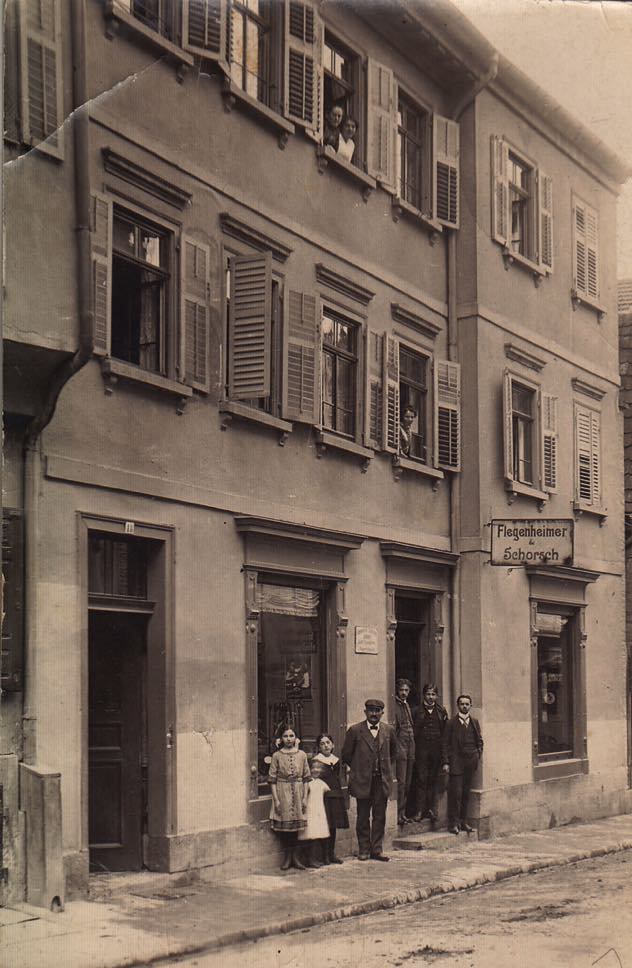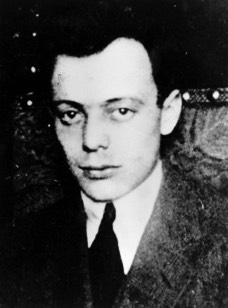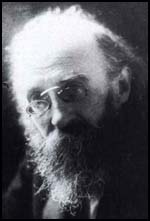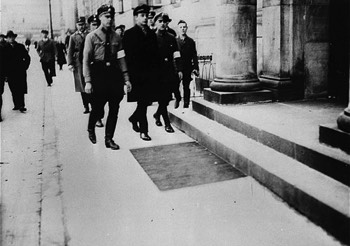
THE BEGINNINGS OF THE FECHENBACH FAMILY
In the 1820's Abraham Ladenburger, born 1766, had a butcher's shop and bakery In the Jews Alley. By that time his parents Loew Joel and Bila Ladenburger had already assumed a family name; they seem to have come from Ladenburg. On 12th November 1817 Abraham Ladenburger's daughter Taicha married Seligmann, son of Lazarus, born 11th March 1792 in Igersheim, who had moved to Mergenthelm. When Seligmann had to choose a family name, it was the name Fechenbach, and so he became the greatgrandfather of all the Fechenbachs in Mergenthelm. Seligmann and Taicha had four children: Reichle, Lazarus, Guta and Louis, of whom only Lazarus remained in Mergenthelm. Lazarus Fechenbach, born 12th June 1822, courted Jetta Mai, born 8th October 1830 in Mergenthelm. The parents owned an Inn and Jetta came daily to fetch water from the well, which Lazarus daily carried home for her. The two married on 24th October 1854 and became my greatgrandparents.
At the time when my grandfather Lazarus Fechenbach became a Jewish citizen of Mergenthelm through the law brought in on 13th August 1864, he owned the butcher's, the bakery and the inn. He was strictly orthodox, and my father told me that he used to occupy his free time learning the Talmud. Grandmother wore her parting In the middle with her hair as was prescribed for married women. Her hospitality was renowned. They had nine children of whom three died in early childhood:
Seligmann, born 28th September 1857, did one year's active military service and set himself up as a corn dealer in Mergenthelm.
Noe, born 11th April 1859, did three year's active military service in the cavalry. Later on he ran the bakery in Mergenthelm.
Auguste, born 28th September 1862, married Samuel Ldffel and moved to Augsburg.
Abraham, born 4th April 1865, was for years a gymnastic demonstrator and teacher in Mergentheim's gymnastics club. He served as a soldier for two years and settled down as a baker in Mergenthelm.
Therese, born 14th April 1867, married Morltz Ettlinger and moved to Karlsruhe.
Michael Max, born 6th February 1870, was an active soldier for two years and later settled as a butcher in Mergenthelm.
Seligmann Fechenbach married Jetta (born Rosenfeld) from Wachbach, although without the full agreement of his parents. He was the rebellious spirit in the very traditional family. Jetta Rosenfeld was said to be very beautiful and so she had many admirers. The Mergenthelm animal trader, Salomon Strauss could never forget that his beloved Jetta had preferred my uncle Seligmann, and he remained forever a bachelor.
Seligmann and Jetta Fechenbach had six children, who all saw the light of day in Mergenthelm:
Morltz Maier, born 9th June 1884, served in the first World War (1914-18), received the Iron Cross and the Wurttemberg Medal of Merit. He now lives in Tel Aviv.
Rosa, born 26th July 1886, married Kaizhu Kalmanovicz and moved to Elberfeld. After her husband's death, she took a job as housekeeper to Max Salzer in Jerusalem and became his wife. She died in 1969 at the home of her children in Elberfeld.
Berta, born 18th July 1890, married Beer Sudovicz, who worked in the Fechenbach rag sorting business. He later started his own business and moved to Halle, and his mother-in-law followed him there. In October 1933 the whole family emigrated to Palestine.
Adolf Abraham, born 14th August 1887, served In the first World War on the East Front in Turkey and Palestine. He was awarded the Iron Cross and the Turkish Half moon. He died In a Nazi concentration camp.
Johanna, born 15th October 1892, married Mordechai Mendel Kaufmann and moved to Leipzig. In 1936 they emigrated to Palestine where her husband died. Today she lives close to her children in Hadera, Israel.
Therese, born 2nd October 1893, married Ascher Fuchs in Leipzig and moved to Warsaw where her husband died. She was murdered by the Nazis together with her children, Hannelore and Ingebert in the Warsaw ghetto.
Noe Fechenbach, son of Lazarus and Jetta Fechenbach, married Rosalie Weikersheimer from Gaukttnigshofen. He and his brother Abraham took over the bakery together. After three years he set up on his own and moved to WUrzburg. Five sons were born from this marriage, two of them in Mergentheim:

Felix Fechenbach (1894-1933)

Kurt Eisner (1867 - 1919)
A German Jew, socialist journalist and statesman. Jailed in 1917 at the hight of World War 1 for his role in inciting a strike of munitions workers. He spent 9 months in Cell 70 of Stadelheim Prison. Organised the Socialist Revolution in 1918 which overthrew the monarchy in Bavaria and became the first republican premier of Bavaria.
On 21st February 1919 on this way to present his resignation to the Bavarian Parliament he was assassinated by Anton Graf von Arco auf Valley (know as Anton Arco-Valley).
Anton Graf von Arco auf Valley spent from 1920 to 1924 in Cell 70 of Stadelheim Prison the same cell as Eisner had been held and was evicted from his cell to make way for Adolf Hitler.
Anton Graf von Arco auf Valley was released in 1925 and pardoned in 1927. His action inspired a young Joseph Goebbels.

The SS arrest of Felix Fechenbach, editor of the Detmold Volksblatt (The Detmold People's Paper, a Socialist newspaper), on March 11, 1933.
Siegbert, born 6th September 1892, in Mergentheim, and Felix, born 28th November 1894 who became an extraordinary character and therefore I must write at greater length about him. He grew up in poverty. He could hardly understand what was going on around him when he already had to help in the house. At an age when he should have needed help to cross the street, he and his elder brother had to go out in the early morning light, delivering bread to an ever-increasing area of the town of Würzburg. Later, when he went to school, he was already tired by the time he arrived. But neither in primary nor in secondary school did he have anyone at home to help him with his homework. He remained the delivery boy for the shop and for this reason had to neglect his schoolwork. The house in the Ursulinergasse in Würzburg was a part of the former monastery. Vaults and dark corridors, in which our voices echoed horribly, were the scenes of our romantic children's games. This old ruin and the images of the early morning town, which impressed themselves upon the young delivery boy, together gave rise to an extraordinary gift of imagination. His brothers always wanted him to tell them stories and Felix was never short of ideas. His first tender childhood friendship developed with Stoffele, the girl next door. She died at the early age of 7 years, and for a long time afterwards, Felix would burst into tears whenever the child's name was mentioned. When he started an apprenticeship at the age of 13, he received his first new suit. The records of a Würzburg shoe shop state he worked there from 1907 to 1911 as an apprentice and assistant, and that he proved himself always to be honest and hard-working, so that they would recommend his services to anyone. Felix found a new job in a shoe wholesalers in Frankfurt. When the new boss wanted to lengthen the working hours without any wage increase, the seventeen year old assistant Felix united all the personnel in firm resistance. The result taught him his first big lesson, namely that socialism lay beyond people's education; the other employees went behind his back and made their peace with the crafty employer, whilst Felix was given the sack. Unemployed, then casual worker, messenger, salesman and again unemployed - this is the life of the young man, who sits eagerly over his books, attends edifying lectures and goes to discussion evenings with other young workers. Felix had hardly settled into his new job in a Munich footwear shop, when he became so successfully involved in political and union work that people became wary of the gifted young activist. On 1st November 1912, he left his new position and became an assistant in the workers secretariat in Munich. Thus Felix Fechenbach had become an active official in the labour movement. During this time he went to continuation school to extend his elementary knowledge.
On 30th August 1914, he received a letter of conscription to active service. In February 1915 he was wounded whilst out on patrol. In March he wrote cheerfully from the military hospital in Pforzheim: "Now I only have a shot wound, a bladder infection, two boils and six endocrine glands - otherwise I feel fine". He was awarded the Iron Cross, Class II.
Siegbert, his elder brother, had already been brought home severely wounded in the first year of the war, and Max, his third brother, had been captured by the French and also had had a leg amputated. The sons should have been able to support their parents, who could no longer afford to run the bakery since there was no chance of their earning any profit. There seemed to be no end to the suffering of the Fechenbach family.
Felix, once again on the West Front, wrote: "The voice from the mass grave. The scene is Flanders, One grave mound after another - mass graves. I stand late in the evening before an overgrown mound of earth. The stone on top of it informs me that 83 grenadiers lie buried here 'fallen on the glorious battlefield...'".
Once again in Munich he got to know Kurt Eisner and this was the most eventful period of his life. On 9th November 1918, the royal ministers, toppled by the revolution, left their offices and the new republicans took their places. Felix Fechenbach became secretary to the new Prime Minister, Kurt Eisner, who had recognised the damage caused by the old parliamentary system and who wanted to create a new form of democracy. On 21st January 1920, Eisner was shot In the back in Munich. His murderer, Count Arco-Valley, had hidden himself in a doorway and then, when Eisner crossed the street with Felix had crept after them. Kurt Eisner was dead. Now the opposition regarded the "liquidation" of his right-hand man as their next target, namely Felix Fechenbach. However only later was he to succumb to the kind of political murder of which his friend and teacher had become the victim. First of all judicial murder demanded its "rights".
Felix Fechenbach turned his journalistic activity to the service of international communication in which he saw the foundation of lasting peace. That included blunt revelations of the misdeeds which had earned Germany the world's hatred. But as in the past, anyone representing a peaceful Germany in the international press, and branding her warmongers, made himself a target for the charge of treason. Felix Fechenbach was taken to court, accused of publishing documents supposedly harmful to Germany. The sentence <11 years jail and 10 years loss of honour), given by judge Hass after a 10 day long court process, caused a stormy protest amongst all those with any sense of right and wrong. Indeed, after a number of years the imperial court lifted the jail sentence as being too unjust, but Felix had already had to spend more than 2 years behind bars. His book about "The House of the Joyless" bears witness to this degrading life.
In the year 1929, Felix was chosen to be editor of the "People's News" in Detmold. His many short stories and fairly tales originated from his deep-rooted conviction that only the good endures. By the year 1933 he was still doing this job and his friends constantly warned him to be careful. His faith in German justice and in his many socialist friends, whom he could not abandon, kept him going; so on 11th March 1933 he was taken Into protective custody. After five months in a more or less bearable environment, Felix was told that he was being transferred. The 450km. car journey from Detmold to Munich on 7th August gave Felix the suspicion that things were not going to proceed entirely above board. Yet his protests fell on deaf ears. The car transporting him had left at 2.00 pm and only an hour later they were in the forest, with no witnesses…
Frau Irma Fechenbach received the news: "Your husband was wounded yesterday while trying to escape and he died last night. Further news to follow".
Felix's father Noe Fechenbach wrote to his daughter-in-law:
Würzburg, 16.8.1933.
Dear Irma,
We received your letter and have only just got around to answering it. Like you we feel the heavy loss. We heard the sad news on the radio, but did not know where the corpse of our dear Felix was. We phoned all the radio stations but none could give us any information until we secretly found out where the deed had been committed. Max and I left here by car at midnight and at 8.00 am arrived at Scherwede hospital where the body lay. First we had to drive to Warburg and ask for the release of the body. We buried dear Felix in a Jewish cemetery nearby in Rlmbeck. We hope that you and the children are well. Let us hear from you soon. With fond love from your mother, father and grand father.
Noe Fechenbach died on 24th November 1935 In WUrzburg. His wife had already been buried on the April 1935. Both ill-fated parents were spared the further worry over their other sons. Moritz died on 24th December 1939 in Berlin. Max, the seriously disabled soldier, survived the concentration camp and Jacob, who was deaf and dumb, was murdered in the Sachsenhausen concentration camp in 1940.
Abraham Fechenbach, son of Lazarus and Jetta Fechenbach, married Emme FUrth, born 8th December 1872, in Eppingen and took over his parent's bakery in Mergentheim. They had six children:
Irma Fechenbach, born 26th June 1899 in Mergentheim, was deaf and dumb and was sent, at the age of 8 to the Jewish deaf and dumb school In Weisensee. There she learnt to be a seamstress and a strikingly beautiful girl. She married the deaf and dumb master tailor Gersmann, a school friend, and lived in Landau(Pfalz). She had two children; a boy who died with his parents in a concentration camp, and a girl named Hilde who was rescued by a friend of her mother.
Max Fechenbach. born 26th October 1900 in Mergentheim, now living in Rio de Janeiro.
Moritz Fechenbach Fechenbach, born 7th March 1904 in Mergentheim.
Jelle Fechenbach, born 27th October 1907 on Mergentheim, was taken to the Jewish orphanage in Esslingen and died in an accident at the age of 18.
Ludwig Fechenbach, born 29th November 1912 in Mergentheim, was likewise taken to the orphanage and died In a concentration camp.
Rosa Fechenbach, born 24th October 1910 in Mergentheim, was deaf and dumb. She died in a concentration camp.
Their father Abraham was highly respected as a young man In the Mergentheim gymnastics club. He found It quite easy to walk from one side of the market place to the other on his hands. There no-one dared to tease him for being a Jew. When he was in the army, the eldest in the room dared to call him a Jew, but he had hardly said it when he got thumped In the neck and hurled so hard against the door that it broke.
The baker's wares that Abraham produced were the best in the whole neighbourhood and so well known, that in 1909 when his majesty Kaiser Wilhelm II had his tactical headquarters in Bad Mergentheim, Abraham was allowed to bake the special bread ordered by the Emperor. How proud I was In those days when I imagined my uncle's shop sign: Abraham Fechenbach, Court Baker to his Majesty Kaiser Wilhelm II". So I was all the more disappointed when my uncle told me that he would have to pay 500 marks for this title. Even though as a twelve year old boy I very much admired our Emperor, the thought still struck me that everything was not as perfect as I had imagined. Of course I was very eager to learn how all the bread and wonderful varieties of cakes and savouries were produced, since all this went on In our common back yard where the bakery was situated. Here, as well as in my home, where my father owned the butcher's and the inn, one could honestly say: "You should earn your own bread by the sweat of your brow".
At least twice a week I watched my uncle and his assistant splitting wood with a long heavy axe. Long thick logs of wood lay on top of a trunk laid at right angles. The axe was raised high and brought down upon the wood with a powerful swing, until each log lay in quarters. At last people are realising with nostalgia what delicious tasting bread was baked in those wood heated ovens. At 6.00 am every morning the freshly baked bread lay on the counter; that meant that they had to begin working even before midnight, and only when this work was finished could my uncle get his well earned sleep. What hard work - and for profits which could be counted in pennies. Two rolls for 5 pfennigs - and what marvellous rolls - not one of them made doughy balls inside them when you chewed it. The very thought of those expertly produced bakery goods makes my mouth water. Even on the Sabbath my uncle did not have a complete day of rest, for the orthodox Jews are not allowed to cook on the Sabbath, so the midday meal was prepared on the Friday beforehand and brought to the baker In the afternoon, so that it could be heated to the right temperature in the bakery oven. It included all kinds of soup, preserved meats and cabbage balls - all genuine Jewish food which could only be made palatable in this way.
Those were good times for middle-class Jewish families who could afford Christian maids. These came mostly from clean and tidy farm families and they knew that in Jewish households they would be well fed and would have the opportunity to learn cookery. On Friday afternoons they would take the ready prepared Sabbath meal to the baker's and would fetch it at about noon the next day. When we came out of the synagogue it was refreshing to see the girls In white aprons coming out through the great wooden door of the bakery, carrying cooking pots and baskets.
Uncle Abraham worked mostly with one assistant whilst Aunt Emma looked after the sales as best as she could In the bakery shop. With so many children running around that was never easy for her, so many a customer took the opportunity to help himself. Just before the Passover It became a Mazzoth bakery and I watched in amazement as the dough was flattened between rollers and pulled over long smooth tables, where women were busily cutting out the round Mazzoth shapes which then went into the oven. This specified procedure was carried out under supervision and my curiosity was not tolerated for long. Despite all the efforts made by Uncle Abraham and Aunt Emma, the hopes of success were not fulfilled and the bakery had to be sold In 1912 to the baker Max Hirschhorn. Abraham Fechenbach's family left Mergentheim and moved to Frankfurt am Main.
© 2021 • Site by numodesign.com